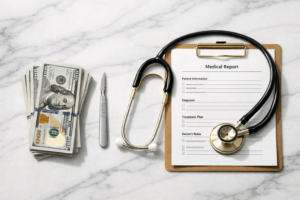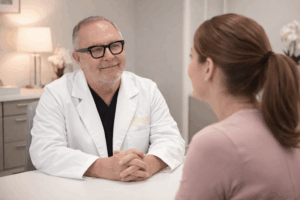Undergoing plastic surgery can be a transformative experience, but it also comes with responsibilities. You’ve invested time and trust in this process, so it makes perfect sense to want a smooth recovery. However, unexpected issues can arise, and recognizing the signs of infection after plastic surgery is an important part of this journey.
It might feel unsettling to think about, but knowing what to watch for helps you act quickly and avoid bigger complications. So, how do you know if something isn’t right?
This guide will help you identify warning signs and understand when it’s time to seek medical help.
Common signs of infection after plastic surgery
Recognizing the signs of infection after plastic surgery is crucial to ensuring a smooth recovery. While some symptoms might seem minor at first, they can quickly escalate if left unchecked. Below are the most common indicators to watch for, along with tips on when to take action.
1. Increased redness or swelling
Some redness and swelling are expected after surgery, but they should gradually decrease as you heal. If the area around the incision becomes increasingly red or swollen over time, or if the redness begins to spread outward, it might signal an infection.
This is especially concerning if the skin feels warm to the touch or develops a rash-like appearance.
2. Persistent or worsening pain
Discomfort is normal in the days following surgery, but it should lessen with time. Pain that lingers, becomes more intense, or feels sharp and localized around the incision site could point to an infection.
Don’t ignore pain that seems out of proportion to what you were told to expect.
3. Unusual discharge or drainage
It’s common to have some fluid drainage from your incision, especially in the first few days. Clear or slightly blood-tinged fluid is normal. However, if you notice thick, yellow, green, or foul-smelling discharge, this could be a sign of infection.
Additionally, an increase in the amount of drainage or pus-like consistency warrants immediate attention.
4. Fever and chills
A low-grade fever in the first 24 to 48 hours after surgery can be part of the healing process. However, a persistent fever above 100.4°F (38°C) or episodes of chills should raise concerns.
These symptoms often indicate your body is fighting an infection and need to be reported to your surgeon.
5. Changes in the appearance of the scar
Pay close attention to your incision as it heals. Unusual changes, such as the edges pulling apart, increased tenderness, or discoloration around the scar, could indicate an infection.
Keep an eye out for signs like a wound reopening or the development of hard, painful lumps near the incision area.
6. General feelings of fatigue or unwellness
Feeling tired after surgery is normal, but if you start experiencing extreme fatigue, a lack of energy, or an overall feeling of being unwell, it may be linked to an infection.
When these symptoms are combined with others, like fever or swelling, it’s time to call your doctor.
By staying vigilant and knowing what to look for, you’ll be better prepared to address any issues promptly. Recognizing these common signs of infection after plastic surgery can make all the difference in ensuring your recovery stays on track.
Read more:
👉How to manage pain and swelling after cosmetic surgeries
Factors that can increase the risk of infection
Certain factors can make some individuals more susceptible to infections after plastic surgery. Understanding these conditions helps you take preventive measures and better prepare for the recovery period.
Pre-existing conditions
Some medical conditions increase the likelihood of infection. For example, diabetes can hinder wound healing and make the body more vulnerable to complications. Patients with autoimmune diseases or those taking immunosuppressive medications are also at higher risk since their immune systems may not respond adequately to infections.
Circulatory problems, such as venous insufficiency, can affect blood flow to the surgical site, slowing the healing process.
If you have any chronic medical conditions, it’s crucial to inform your surgeon beforehand so appropriate precautions can be taken.
Inadequate post-operative care
The recovery period is a critical phase, and how you care for your surgical site directly impacts your risk of infection.
Failing to follow your surgeon’s instructions, such as keeping the incision site clean and dry, changing dressings regularly, or avoiding touching the area with dirty hands, can increase the chances of complications.
Using non-recommended products or exposing the surgical site to contaminated environments also raises the risk. Ensuring that the area remains protected and strictly adhering to post-operative guidelines is essential to avoid issues.
Surgical technique and procedure environment
Although rare, infections can sometimes be linked to the procedure itself. Surgeries performed in facilities that do not adhere to proper sterilization standards carry a higher risk of contamination. Choosing a reputable clinic, such as Illusions Plastic Surgery in West Palm Beach, FL, significantly reduces this possibility.
The duration of the procedure may also play a role. Longer surgeries can increase exposure to bacteria, making preventive measures even more critical.
Smoking habits
Smoking before or after surgery directly impacts circulation and impairs the body’s ability to heal wounds. Nicotine reduces oxygen flow to the tissues, slowing recovery and increasing vulnerability to infections.
If you smoke, consider stopping the habit at least a few weeks before and after the procedure, as recommended by your surgeon.
Obesity or excess weight
Patients who are overweight or obese face a higher risk of complications after surgery, including infections. Excess tissue can make it harder to properly ventilate the surgical area, creating conditions that promote bacterial growth. Additionally, healing may be slower in these cases.
When to seek medical help?
Knowing when to seek medical help after plastic surgery requires more than just watching for obvious symptoms. Signs of infection don’t always present themselves clearly, so paying attention to subtle changes and trusting your intuition about your body is essential. Here’s a practical and different approach to identifying when it’s time to act.
1. Changes that deviate from expectations
Your surgeon likely explained what to expect during your recovery, including moderate discomfort, manageable redness, and controlled swelling.
If something feels “off” — such as unusual pain, difficulty moving, or a sudden increase in a symptom — don’t hesitate to reach out.
Sometimes, unexpected discomfort is the first indication that something needs attention.
2. Disruptions to your daily routine
Not all signs of infection are visible or easy to describe. If you feel unable to perform basic activities, like eating or moving comfortably, and it’s interfering with your daily life, it might indicate that something is wrong.
Pay close attention to symptoms like extreme fatigue, loss of appetite, or changes in sleep patterns.
3. Secondary infections in other parts of the body
An infection after surgery isn’t always confined to the incision site. Some people may develop symptoms in other areas, such as urinary tract infections, skin rashes, or respiratory issues.
These signs could indicate that the immune system is under stress and should be reported to your doctor immediately.
4. Recovery outside the recommended timeline
Your surgeon likely provided a recovery timeline with clear expectations for each phase. If you notice that you’re not progressing as expected or feel “stuck” in an early stage, this could be a warning sign.
For instance, wounds that don’t close or pain that persists weeks beyond the expected timeframe should be evaluated.
Read more:
👉Post-surgical Diet: How nutrition impacts recovery
How Illusions Plastic Surgery Supports Its Patients
Illusions Plastic Surgery, located in West Palm Beach, FL, provides comprehensive support to ensure a safe and personalized experience at every step of the surgical process.
The clinic features a team of highly trained and experienced plastic surgeons, supported by state-of-the-art facilities and advanced technology. This commitment to medical excellence and patient safety ensures effective procedures and high-quality results.
Detailed pre-operative guidance
Preparing for plastic surgery is as crucial as the procedure itself. Illusions Plastic Surgery provides detailed pre-operative instructions, including initial consultations to discuss goals and concerns, necessary medical tests, and guidance on nutrition, hydration, and specific pre-surgical care.
These measures ensure that patients are well-informed and prepared, contributing to a safe and satisfying outcome.
Ongoing support during recovery
Illusions Plastic Surgery extends its support into the post-operative period, offering continuous follow-ups to monitor recovery and ensure patients adhere to proper medical advice.
The team is available to answer questions, provide guidance, and promptly address any concerns, fostering a smooth and effective recovery process.
By choosing Illusions Plastic Surgery, patients not only undergo a transformative aesthetic journey but also become part of a family dedicated to their well-being.
The clinic takes pride in delivering exceptional results that enhance confidence and self-esteem, offering an experience that transforms lives.







